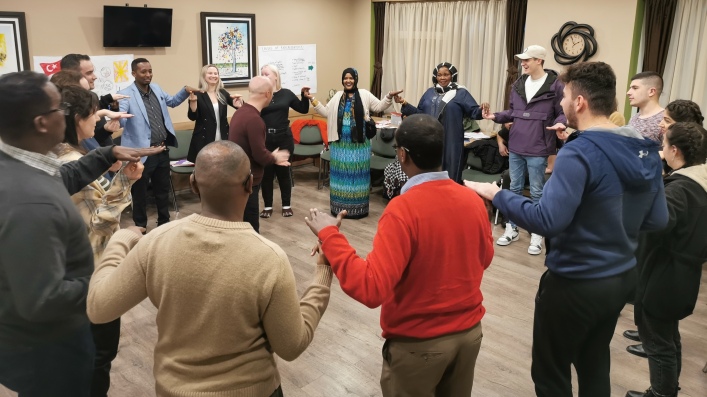“Preventing the conflicts of tomorrow means changing the mindset of youth today.”- Graça Machel
While most of us are familiar with the concept of radicalization, it is often difficult to define it. We also narrow down its meaning to a specific group, e.g., terrorist or religious groups, which does not reflect the phenomenon’s complexity. What is radicalization? How can we prevent it? The participants of the training course “Preventing radicalization of young people through youth work” answered these and many more questions about radicalization and shared good practices in preventing this process.
About thirty youth workers from eight countries were part of the training course: “Preventing radicalization of young people through youth work” held in Struga, Macedonia, from November 25th to December 3rd. The training course was organized in cooperation with Puntland Community ry from Finland, which coordinated the activities and was funded by Erasmus+ program. Volunteers Centre Skopje was the host and implementer of the project.
The increasing number of terrorist attacks in recent years, migrant crisis, separatism, and rise of nationalism all over Europe have become the push factor for radicalization processes. What do we understand by the term radicalization? Radicalization is the process by which individuals or groups embrace extremist beliefs that support violence as a method to achieve changes in society. The radicalization of social views and behavior is gaining momentum and is a growing threat to democracy in Europe and the world. Researches show that especially young people are exposed to the indoctrination of radical circles. The project “Preventing Radicalization of Young People Through Youth Work” precisely addressed this issue: the radicalization of young people and the need for more knowledge, competencies, and action to prevent this malicious phenomenon.
During the project, participants examined and discussed the key factors that trigger and fuel youth radicalization: social exclusion, inequality, the polarization of political views, stigmatization of dissimilarity, and hate speech. What do radicalized youth have in common? They might struggle with rejection, a sense of injustice, or danger. When they feel left out, they might look for groups and people that will understand them. How can we prevent the radicalization of today’s youth? The participants of the training course shared some ideas. Kerli Telve from Estonia said that we need to “create joint activities for different people so everyone could learn that besides all the differences, we have more things in common”. “We must provide education, tolerance, employment opportunities, and integrate youth.” added Emine Girişken from Turkey. What advice can we give to parents? “The best way to prevent our children from radicalization is to know more about their lives and activities.” shared Abdulaziz Ibrahim from the UK. Except for supporting the exchange of good practices in the field of youth radicalization through sharing positive experiences from different countries, the participants highlighted the importance of accepting cultural diversity. They reflected on stereotypes in their home countries and the countries of other participants and shared their knowledge about accepting and promoting cultural diversity in education, business, and local communities. The participants also had the opportunity to learn more about the culture of their hosting organization. And what is the best way to immerse yourself in a foreign country’s culture? Explore its beauties! During the project, the participants had the chance to visit one of the main travel destinations in Macedonia – Ohrid.
Besides a huge dose of knowledge and ideas for the future, the participants got fond memories and gained lifelong friendships during eight days in Struga. The project provided space for networking and developing new ideas for preventing youth radicalization through the mutual work of youth workers from various European organizations and improved the capacity of participating organizations by providing them with new youth work practices and effective activities addressing youth radicalization.
Jolanta Ciopcińska



